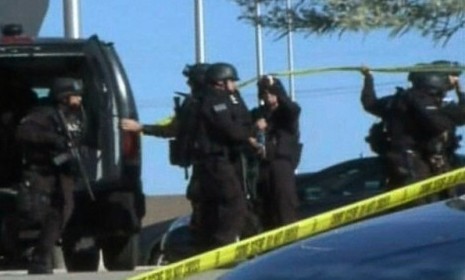Red flags at Fort Hood
Did the Army ignore "strong" warning signs that Fort Hood shooter Maj. Nidal Hasan was an Islamic extremist?

A free daily email with the biggest news stories of the day – and the best features from TheWeek.com
You are now subscribed
Your newsletter sign-up was successful
The U.S. Army is under fire as new reports about Fort Hood killer Maj. Nidal Hasan suggest that he was openly sympathetic to extremist Islamic beliefs. Colleagues say Hasan was given to "anti-American rants," attended a radical Wahhabi mosque in 2001, and gave a 2007 class lecture reportedly proposing that infidels (non-Muslims) should be beheaded. Sen. Joe Lieberman, who’s leading an investigation into this "terrorist act," says "strong warning signs" were there. (Watch Lieberman and others debate religion’s role in the killings.) Did the Army fail to avert tragedy by ignoring these red flags?
How did the military miss such obvious clues? I’m baffled why military brass didn’t intervene "long before [Hasan] snapped," says James Ragland in The Dallas Morning News. Hasan gave clear signs of being caught between "his military responsibilities and his Muslim beliefs." Such a "combustible cocktail" should have "set off bells and whistles with the Army’s brass."
"Somehow, all the red flags went unheeded in Fort Hood tragedy"
The Week
Escape your echo chamber. Get the facts behind the news, plus analysis from multiple perspectives.

Sign up for The Week's Free Newsletters
From our morning news briefing to a weekly Good News Newsletter, get the best of The Week delivered directly to your inbox.
From our morning news briefing to a weekly Good News Newsletter, get the best of The Week delivered directly to your inbox.
Was the Army being overly political correct? Not monitoring or disciplining an Army officer who gives a med-school talk on jihad is "mind-blowing," says Andrew Sullivan in The Atlantic. Did the Army fear the repercussions of censoring a Muslim? If so, that’s political correctness “at its most lethal.”
Let’s give the Army the benefit of the doubt: It’s entirely possible "that 'the Army' had no idea" that Hasan was a ticking time bomb, says James Joyner in Outside the Beltway. Hasan’s leaked "psychological evaluations were apparently well within normal range," and it’s not uncommon for officers to express "bitterness at missions they don’t believe in." Despite our "natural desire to…make sense of tragedy," claims that the military is knowingly letting enemies infiltrate our ranks are "unhelpful."
"Hasan a Muslim first, American second?"
A free daily email with the biggest news stories of the day – and the best features from TheWeek.com
Consider history before you assign blame: Hindsight is 20/20, says USA Today in an editorial: "As fans of mystery novels know, it’s always easier to connect the dots after you’ve read the book." It’s worth noting that after similar tragedies—Columbine in 1999 and Virginia Tech in 2007—"the most oft-repeated phrase" was also: "Warning signs were missed."
........................................................
SEE MORE OF THE WEEK'S COVERAGE OF FORT HOOD:
• Fort Hood: The Al-Qaeda question
• Fort Hood: What the world is saying
• Sunday Talk Show Briefing: Religion's role in Fort Hood (Video)
• Fort Hood: Obama's "flippant" speech